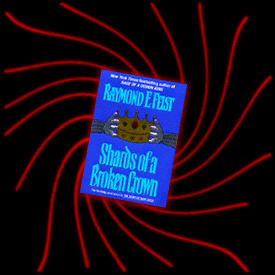 "When I hit The New York Times bestseller list for A Darkness at Sethanon, I was living in a small, two bedroom apartment on a very busy street in San Diego. Since then I've been very successful, which changes anybody's life dramatically. My family and I now live in a lovely house on a large ranch where we raise horses. Yet in terms of my work, there's not much change at all.
"When I hit The New York Times bestseller list for A Darkness at Sethanon, I was living in a small, two bedroom apartment on a very busy street in San Diego. Since then I've been very successful, which changes anybody's life dramatically. My family and I now live in a lovely house on a large ranch where we raise horses. Yet in terms of my work, there's not much change at all.
"In Shards, I'm dealing with third-generation characters. It's the task of the writer to stay fresh and constantly be looking for new things. For me, writing about generations and new characters does this. If I were writing about one character, à la James Bond, I'd be hard pressed to stay on top of my game. Probably the most brilliant series on one character was written by John D. McDonald. Travis McGee was a lesson to me on how to do a series around one character; to create evolution and change and yet hang on to the essential qualities of the character -- that makes the series successful."
Two factors drew Feist to fantasy. One was the fact that "nobody writes adventure fiction any more -- what was called 'boys' adventure fiction' when I was growing up," he says. "I read Robert Louis Stevenson and Anthony Hope (Prisoner of Zenda), Alexandre Dumas (Three Musketeers). I also read historical novels by Costain, Renault, and Shellenbarger. The closest in the modern market to these is fantasy."
The second thing was that while attending the University of California, San Diego Feist got hooked into a fantasy role-playing group of grad students. Thus he could inhabit a ready-to-go environment. It was easy for him to drop his stories into that "real estate," he says, because it was an objective virtual world. "I didn't have to make decisions on world-building. I could just tell a story with an added level of verisimilitude. I could deal with issues, making it much like writing a historical novel. I wrote historical novels about another world."
After he graduated from UCSD with a degree in communications arts, Feist worked in the health and human services field, until a tax "revolt" in California cut his funding. "When you're unemployed you have time on your hands," he laughs. "That's when I wrote Magician. After that, the rest is history, as they say."
Part of that history, of course, includes computer gaming. Although computer games and fantasy novels can look similar on the surface, the two media demand different things of a story, Feist explains. "Right now I'm writing Krondor as a novel. There are lots of things in the computer game -- like some of the subquests -- that will never make it to the pages of that book, because while they're good gaming, they're bad story-telling. Much of the dialog, entirely appropriate for the game environment, would look dumb on the page. And there's stuff I could write on the page that would look really underplayed and held back in the game. I learned early on that storytelling in computer games is bigger, more theatrical, more like doing melodrama than drama."
Since Feist has a huge readership, with his works translated into 15 languages, he tends to wonder at fantasy's attraction. "You start with the thesis that all fiction is fantasy," he begins, "none of it is real. I don't want to sound like Joseph Campbell here, but High Fantasy -- sword and sorcery, quests and dragons -- speaks to a fairly basic human astonishment at the universe. Humans are the only creatures that intentionally put ourselves in harm's way. Yet we often don't know what's out there. And when we don't we often make up an answer. Cynics might say that's the basis of all organized religion. Others say it's the underlying root of mythic structures. And on top of all this deep sounding stuff, fantasy is also a satisfying entertainment. You can go out and confront evil, vanquish the monsters. And put the book down and deal with the real nightmare in your life -- the IRS. Fantasy has been around since the epic of Gilgamesh. There's something about 'Let's pretend' that sings to the child in all of us."
Feist is finishing his next computer game, Return to Krondor, to be published by Pyrotechnix, Inc. in 1998. He is also working on a science fiction project -- novels based on Betrayal at Krondor and Return to Krondor -- then a new, as-yet untitled epic fantasy series. Feist currently resides in Rancho Santa Fe, California, with his wife, novelist Kathlyn S. Starbuck, his children, and assorted horses and cats.
|

